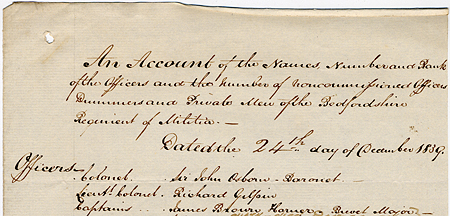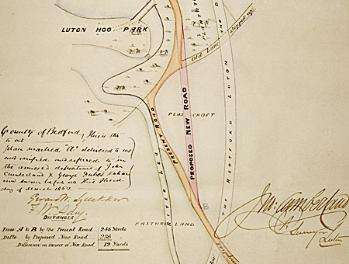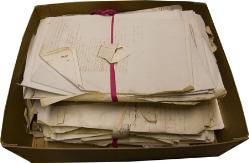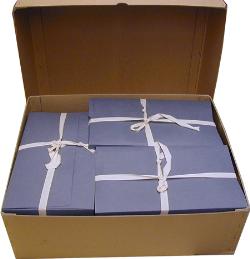Paths to Crime
In 2020 Bedfordshire and Luton Archives Service were delighted to announce the launch of "Paths to Crime" .

This was an exciting project to catalogue the Bedfordshire Quarter Sessions Rolls 1830-1900 made possible by a grant from the National Cataloguing Grants Programme for Archives. The grant of £38,700 paid for cataloguing staff for two years. In addition to this, the project repackaged the documents to preserve them for the future.
We were grateful to The National Cataloguing Grants Programme for Archives, which is collectively supported by the Pilgrim Trust, the Foyle Foundation, the Wolfson Foundation, the Monument Trust, J Paul Getty Jr. Charitable Trust, the Gladys Krieble Delmas Foundation, the Mercers Company Charitable Foundation and the Goldsmiths Company. The National Archives provides additional funding, together with expert and secretariat support for the programme. We would also like to say thank you to Bedfordshire Local History Association, Bedfordshire Historic Records Society and Bedfordshire Family History Society for their support for our stage one application, and to the High Sheriff, Mr Daniel Hanbury, Mr Charles Lousada, Sir Sam Whitbread and the Rotary Club of Sandy for their support and contributions towards the cost of repackaging.
What are the Quarter Sessions Rolls?
Originally, the Quarter Sessions formed the backbone of local government dealing with all manner of things from rights of way to the prosecution of criminals. As the name suggests, the Quarter Sessions were held once a quarter at Epiphany, Easter, Midsummer and Michaelmas. At each court the clerk collected together the working papers, which were then threaded onto a cord and rolled for storage, giving the Quarter Session Rolls their name.
The duties of the court changed throughout the nineteenth century, for example: due to changes to the Poor Law in 1834, the prison system in 1878, and the creation of the County Council in 1888, until, by 1900, the court was almost solely a part of the criminal justice system. These changes are reflected in the Quarter Sessions Rolls, which contain a range of documents including: footpath diversion orders, reports and bills for bridge, road, gaol, and sessions house maintenance, lists of those serving in the militia, coroners’ bills, sacrament certificates, constables’ bills and presentments, indictments, recognizances, depositions, memoranda of conviction, gaol calendars, gaol keepers’ bills, and petitions for clemency.
The Bedfordshire Quarter Sessions records are among the core holdings of Bedfordshire & Luton Archives Service. They are public records of local, regional, national and international significance, offering amongst many things:
- a name-rich source, important for the family historian
- a comparative source for researchers of social history
- quotations of direct speech, providing clues as to dialect and education
- insight into the lives of people in Bedfordshire, including their public service on juries, or in the militia, or their criminal careers.

A random sample from 1840, 1868, 1880 and 1900 gives a small indication of the wealth of social detail to be found in the rolls. They tell us about:
- road building: In 1840 two justices declare the new public road at Heath & Reach 'fully and sufficiently formed'.

- work: the 1868 deposition of Arthur Thomas Webster ‘merchant and manufacturer at Luton’, details how his business was conducted and that the defendant ‘was in my employment as a commercial traveller and had been so from January last at a salary of £120 a year and one pound a day travelling expences’.
- trade: In 1880 a group of men were accused of stealing 19 pieces of pedel plait, 69 score of white twist plait and 1/4 bale of Canton straw plait the value of each being given in the indictment. The thefts always happened at 4 pm when the owner had gone home to take tea with his wife.
- economics: In 1900 John Driscoll admits to being 'guilty of stealing a pair of shears at St Albans. I was two months out of work and starving. The tailoring of late years has become very bad in consequence of which I am often tempted to steal.'
- agriculture: In 1900 the chief constable reported outbreaks of swine fever and sheep scab and names the farms on which they occurred.
- leisure: Eliza Harris was ‘in the fair at Luton looking at a steam roundabout’ when her pocket was picked.
- food, drink and health: Sarah Sharman, aged 12 from Riseley ‘had been...for some currants tea & sugar to make her father some currant gruel, for he was ill’ and,
- the criminal justice system in action: ‘I apprehended the defendant at Liverpool...he was in custody at the Police station on this charge, I said I have a warrant which charges you with embezzlement at Luton...I afterwards read the warrant to him...’
Why, if they are so good, have they not been catalogued before?
The Bedfordshire Quarter Sessions Rolls up to 1831 were catalogued before 1905, albeit in a rather idiosyncratic manner reordered by year, and bound into enormous volumes. They are useable and gradually the original catalogue is being expanded and improved.
By contrast the Quarter Sessions Rolls after 1831 have been largely forgotten. The nature of some of the documents meant that they were closed to the public for a long period to protect the people concerned. However we also have to admit that it can be easy to ignore what is under your nose. How many times do people holiday far from home rather than visiting the attractions on their doorstep? The same can be true for archives, where incoming material takes priority over deposits held for many years. We always intended to catalogue them but just never got round to it, the funding made this intention a reality.
How did the project work?
The project employed staff to catalogue the rolls onto our cataloguing software. The task was a large one with an estimated 41,000 documents to be catalogued. Although many of the documents are pro forma and therefore quite easy to do, others were more of a challenge, particularly when the handwriting was difficult to decipher. Working alongside the cataloguing staff, volunteers repackaged the documents to ensure that they are protected and easier to retrieve for use in the searchroom. The catalogues are available on-line via the “search our catalogues” pages of our website.


After Paths to Crime
The project finished in 2013, since then two of the volunteers have continued to work on the later Quarter Sessions records and in 2025 they completed the cataloguing of the Quarter Session Rolls up to 1923. We are not currently intending to go beyond 1923 partly because the volunteers have earnt a rest from them and partly because the records under 100 years old may refer to people who are still living and therefore need to be protected under Data Protection Legislation. We will undoubtedly revisit the project in years to come.